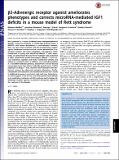β2-Adrenergic receptor agonist ameliorates phenotypes and corrects microRNA-mediated IGF1 deficits in a mouse model of Rett syndrome
Author(s)
Mellios, Nikolaos; Woodson, Jonathan; Garcia, Rodrigo; Crawford, Benjamin; Sharma, Jitendra; Sheridan, Steven; Sur, Mriganka; Haggarty, Stephen J.; ... Show more Show less
DownloadMellios-2014-beta 2-Adrenergic re.pdf (1.037Mb)
PUBLISHER_POLICY
Publisher Policy
Article is made available in accordance with the publisher's policy and may be subject to US copyright law. Please refer to the publisher's site for terms of use.
Terms of use
Metadata
Show full item recordAbstract
Rett syndrome is a severe childhood onset neurodevelopmental disorder caused by mutations in methyl-CpG–binding protein 2 (MECP2), with known disturbances in catecholamine synthesis. Here, we show that treatment with the β2-adrenergic receptor agonist clenbuterol increases survival, rescues abnormalities in respiratory function and social recognition, and improves motor coordination in young male Mecp2-null (Mecp2−/y) mice. Importantly, we demonstrate that short-term treatment with clenbuterol in older symptomatic female heterozygous (Mecp2−/+) mice rescues respiratory, cognitive, and motor coordination deficits, and induces an anxiolytic effect. In addition, we reveal abnormalities in a microRNA-mediated pathway, downstream of brain-derived neurotrophic factor that affects insulin-like growth factor 1 (IGF1) expression in Mecp2−/y mice, and show that treatment with clenbuterol restores the observed molecular alterations. Finally, cotreatment with clenbuterol and recombinant human IGF1 results in additional increases in survival in male null mice. Collectively, our data support a role for IGF1 and other growth factor deficits as an underlying mechanism of Rett syndrome and introduce β2-adrenergic receptor agonists as potential therapeutic agents for the treatment of the disorder.
Date issued
2014-06Department
Massachusetts Institute of Technology. Department of Brain and Cognitive Sciences; Massachusetts Institute of Technology. Research Laboratory of Electronics; Picower Institute for Learning and MemoryJournal
Proceedings of the National Academy of Sciences of the United States of America
Publisher
National Academy of Sciences (U.S.)
Citation
Mellios, Nikolaos, Jonathan Woodson, Rodrigo I. Garcia, Benjamin Crawford, Jitendra Sharma, Steven D. Sheridan, Stephen J. Haggarty, and Mriganka Sur. “ β2-Adrenergic Receptor Agonist Ameliorates Phenotypes and Corrects microRNA-Mediated IGF1 Deficits in a Mouse Model of Rett Syndrome.” Proceedings of the National Academy of Sciences 111, no. 27 (June 23, 2014): 9947–9952.
Version: Final published version
ISSN
0027-8424
1091-6490